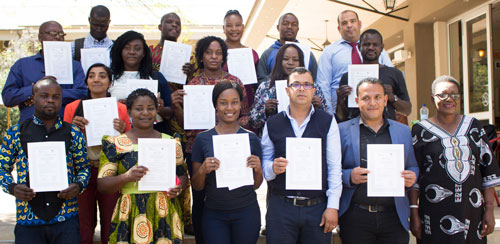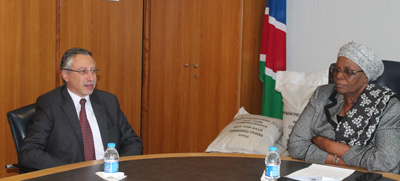
Improving resilience to drought through mutation breeding

Participants from different countries received certificates they finished a training course on “Improving Resilience to Drought through Mutation Breeding” held from 24-28 April at the Mannheim Research station, Tsumeb.
Director of Directorate of Agricultural Research and Development (DARD), Ms Johanna Andowa, at the occasion of the event hoped the knowledge and skills acquired will be put into practice as Africa strives to increase its agricultural production and productivity in order to feed the ever increasing population on the back dwindling resources.
The training Course, was hosted by Namibia through of the Ministry of Agriculture, Water and Forestry, in cooperation with the IAEA under African Regional Cooperative Agreement for Research (AFRA), Development and Training Related to Nuclear Science and Technology.
This course was attended by participants drawn from 15 countries across Africa (Benin, Burundi, Cameroon, Central African Republic, Coté D’Ivoire, Democratic Republic of the Congo, Egypt, Ethiopia, Ghana, Libya, Mauritius, Senegal, Sudan, Tunisia and Zambia who all representing universities and research institutions in their respective countries.
According to Andowa, the purpose of the course, was to provide participants theoretical as well as practical information to mutation induction, mutation screening and breeding drought tolerance in crop breeding.
“The expected outputs of this course were capacity building, technology transfer and awareness of opportunities in the application of nuclear techniques in plant breeding for improving resilience,” she added.
According to her through the IAEA and AFRA Technical Cooperation Programme, the Ministry has witnessed important transfer of the technology through staff training, procurement of equipment, regional training and expert services.









































